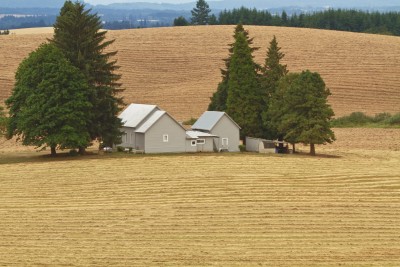By Andrew Mulkey | 4-minute read
Earlier this month, the Oregon Court of Appeals overturned a ruling by the Land Use Board of Appeals (LUBA) that would have allowed landowners to build hotels on farmland – an exceptional misuse of our precious working lands. The Court of Appeals’ ruling is an important win for safeguarding our farmland, not only in Yamhill County, where the case was based, but also across the state, where our land use system consistently protects our farms from being picked apart, and their land diverted for unintended, non-farm activities.
1000 Friends of Oregon represented Friends of Yamhill County to stop this poor decision from ever taking effect. Our team, led by staff attorney Andrew Mulkey, appealed LUBA’s opinion, which had convoluted an existing statute – called the home occupation statute – that currently allows homeowners to operate a small-scale business within their home on farmland.
1000 Friends supports appropriate use of the home occupation statute, including the use of a dwelling to run a bed and breakfast. We know that the statute at the heart of the case comes with a number of restrictions to help ensure that structures built on farmland don’t overtake the land’s primary intended use as productive, working land.

Among these restrictions, building code and statute currently limit farm dwellings to five guest rooms that can be used for temporary, overnight occupancy. The five-guest-room limit also ensures that a bed and breakfast remains within the size and scale appropriate for a home occupation permit on farmland.
These common-sense limitations to home occupations often get misused or bypassed in cases like this. And although our case ended in a victory for farmlands, we still need reforms to the home occupation statute in order to ensure that businesses being run as home occupations remain just that: an occupation or business, run out of a farm dwelling or accessory building, that does not affect nearby farming operations or, more systematically, the future availability or affordability of farmland for farming.
This case is a great example of the issue. Here, the applicant – Grange Hill LLC – sought to use farmland to operate a nine-bedroom bed and breakfast, proposing a structure that amounts to a small hotel in both concept and in its proposed building design: nine hotel rooms, each with their own full bathroom, and fire-rated doors and walls, plus one suite designated as the innkeeper’s residence. LUBA had agreed with the applicant, who claimed that the structure still qualified as a dwelling because the hotel's resident innkeeper would use the building as a residence.
Not surprisingly, hotels don’t fit into the definition of a “home occupation,” which, in this case, requires the small business to operate out of a structure designed as a dwelling or home. The applicant couldn’t possibly turn the entire building into a hotel while also claiming that the entire building still qualified as the occupant’s dwelling. In fact, the applicant proposed using only a very small portion of the building (one room) as the innkeeper’s residence. Although LUBA overlooked this crucial fact, we’re glad the Court of Appeals corrected the error that, in effect, would have allowed mansions on farmland to be turned into hotels without any limit on the number of hotel rooms rented.
How does this relate to the big picture across Oregon? Had our appeal gone the other way, LUBA’s decision could have opened the door to similar operations across the state. Armed with nothing more than a dwelling permit and a home occupation permit, builders could have potentially begun placing full-scale hotels on farmlands across the state, dotting the lands that feed us with new construction.
Armed with nothing more than a dwelling permit and a home occupation permit, builders could have potentially begun placing full-scale hotels on farmlands across the state, dotting the lands that feed us with new construction.
“Friends of Yamhill County sees far too many misapplications of home occupations, conditional use processes, and commercial uses in conjunction with farm activities to permit development that compromises our productive farm and forest lands. This also does a disservice to the local cities and towns, and the people who have invested in compliance,” said Kathryn Jernstedt, President of Friends of Yamhill County. “We are grateful for 1000 Friends’ help in fighting back against these misuses of Oregon's Land Use System.”
While we work to correct these abuses of farmland in the courts and in Salem, you can be part of the solution too. Reach out to your county commissioners – where these cases often start – and to your legislators to say that we need to do right by our farms, the communities built around them, and our land use system as a whole. You can share this issue with them as a case study, and browse our legal wins for even more examples of these attempts.
Let’s put an end to loopholes that intend to pockmark farmlands with unrelated businesses, putting money into the pockets of the few and weakening our land use laws and essential farming operations in the process.
